How to Buy a Cockatoo: A Comprehensive Guide
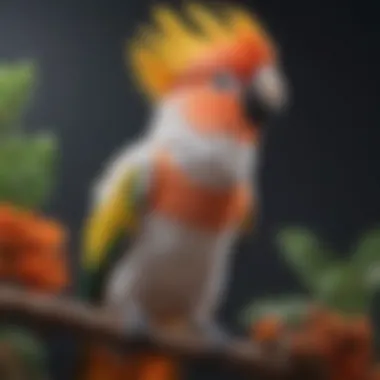
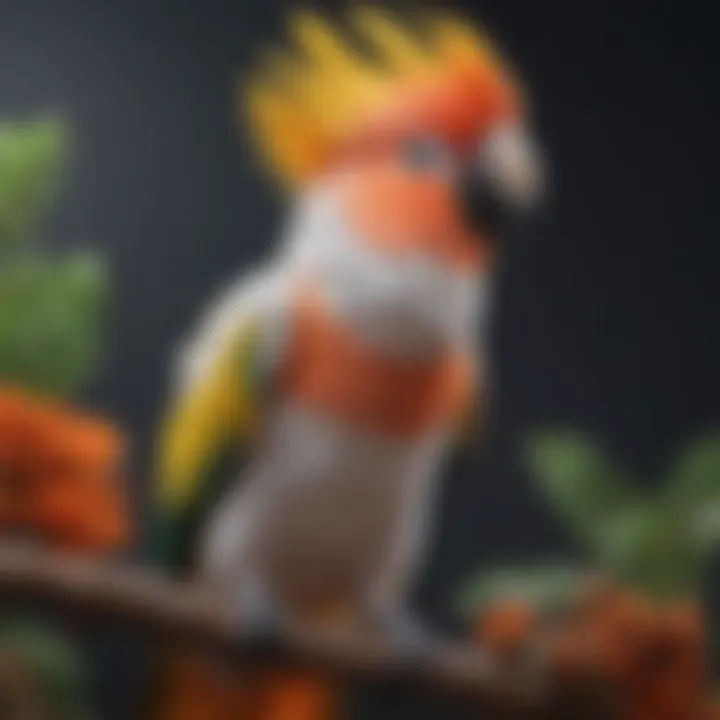
Intro
Purchasing a cockatoo is an enriching decision for potential pet owners. These birds are known for their intelligence, playful nature, and strong bonds with their owners. However, owning a cockatoo requires careful consideration. Understanding their needs and behaviors is crucial for ensuring a healthy and happy environment for these majestic creatures. This guide aims to provide a comprehensive overview of the necessary steps and considerations involved in buying a cockatoo, allowing prospective owners to make informed choices.
Understanding Your Pet
Cockatoos are not just pets; they are complex creatures that require attention and understanding from their owners. A deep grasp of their behavior, characteristics, and specific needs is essential for fostering a positive relationship.
Pet Behavior Basics
Cockatoos are highly social animals. Their behavior often reflects this trait, displaying signs of affection and a desire for interaction. They may vocalize, preen, and engage in playful activities. Understanding these behaviors helps owners respond appropriately, enhancing the bond between them.
Common Breed Characteristics
Different breeds of cockatoos, such as the umbrella cockatoo or the sulfur-crested cockatoo, come with distinct physical and behavioral traits. The umbrella cockatoo is typically known for its impressive crest and playful nature. In contrast, the sulfur-crested cockatoo has a striking yellow crest and can be more vocal. Knowledge of these characteristics helps in choosing the right species for an individual's lifestyle.
Species-Specific Needs
Each cockatoo species has unique requirements. For example, a Galah cockatoo may need more social interaction than a lesser sulphur-crested cockatoo. Understanding these needs ensures that the selected species will thrive in a home environment. Prospective owners must research the specific characteristics of the cockatoo they wish to purchase.
Pet Care and Maintenance
Caring for a cockatoo involves various aspects, from feeding to hygiene. These birds require dedicated attention and a structured routine to ensure their health and happiness.
Feeding Guidelines
Cockatoos have specific dietary needs. A balanced diet includes pellets, fruits, and vegetables. Offering a variety of foods aids in their nutritional balance. Avoiding excessive seeds is also beneficial for their health.
Grooming Essentials
Regular grooming is crucial for cockatoos. This includes nail trimming and feather care. Owners should also consider providing a suitable bathing option, as cockatoos enjoy playing in water. Grooming not only maintains their appearance but also promotes bonding.
Hygiene Practices
Maintaining a clean living environment is vital for a cockatoo's health. Clean their cage frequently, remove uneaten food, and provide fresh water daily. Regular cleaning minimizes the risk of illness and ensures a comfortable habitat.
Training and Development
Training a cockatoo is essential for their development. Learning basic commands and behavioral techniques can improve interactions and facilitate smoother daily routines.
Basic Commands and Skills
Teaching basic commands such as
Foreword to Cockatoos
Cockatoos are fascinating birds belonging to the family Cacatuidae. They are known for their striking appearance, intelligence, and strong social nature. Understanding cockatoos is essential for potential owners to ensure they can meet the specific needs of these birds. Knowledge about their characteristics and behavior can prevent common pitfalls that arise from misunderstandings.
Understanding the Cockatoo Family
The cockatoo family includes various species, each with unique traits and habits. They are native mainly to Australia and surrounding islands. This family is distinct from other parrot families, characterized by their erectile crests and often more subdued colors compared to their parrot relatives. Common species include the Sulphur-crested Cockatoo, Umbrella Cockatoo, and Moluccan Cockatoo. Recognizing the differences among these species helps buyers make informed decisions about which type might be best for their lifestyle.
Some factors to consider when exploring the cockatoo family are:
- Size and Physical Characteristics: They vary in size from small to large, influencing their space needs and potential care requirements.
- Behavior Traits: Cockatoos display a range of behaviors. Some are very playful, while others might be more reserved.
- Vocalization: They can be quite noisy, which may or may not fit well with your living situation.
Cockatoo Characteristics and Behavior
Cockatoos are known for their complex behaviors, which stem from their high intelligence. These birds are not just pets; they are companions that require significant interaction and stimulation. Understanding their behavior fosters a strong bond between the bird and its owner, and learning to interpret their actions can enhance the ownership experience.
Key characteristics of cockatoos include their:
- Social Nature: They thrive on interaction, both with humans and other birds. Those who prefer solitary pets may find cockatoos less suitable.
- Playfulness: They enjoy toys and activities that challenge them mentally. A lack of stimulation can lead to boredom and destructive behavior.
- Affectionate Behavior: Many cockatoos enjoy physical touch and may bond closely with their owners. This need for attention should be a primary consideration before acquiring one.
Cockatoos are companions that require time, dedication, and love. Consider this before making a decision.
In summary, a clear understanding of cockatoo characteristics and their behaviors is critical. It prepares potential owners for the commitment necessary to provide a nurturing and fulfilling environment for these remarkable birds.
Species Overview
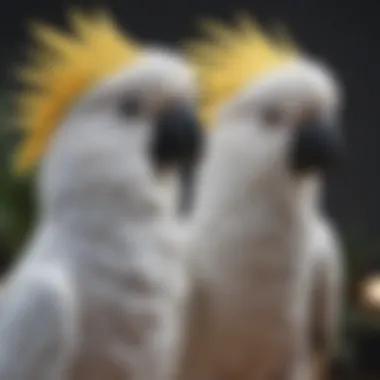
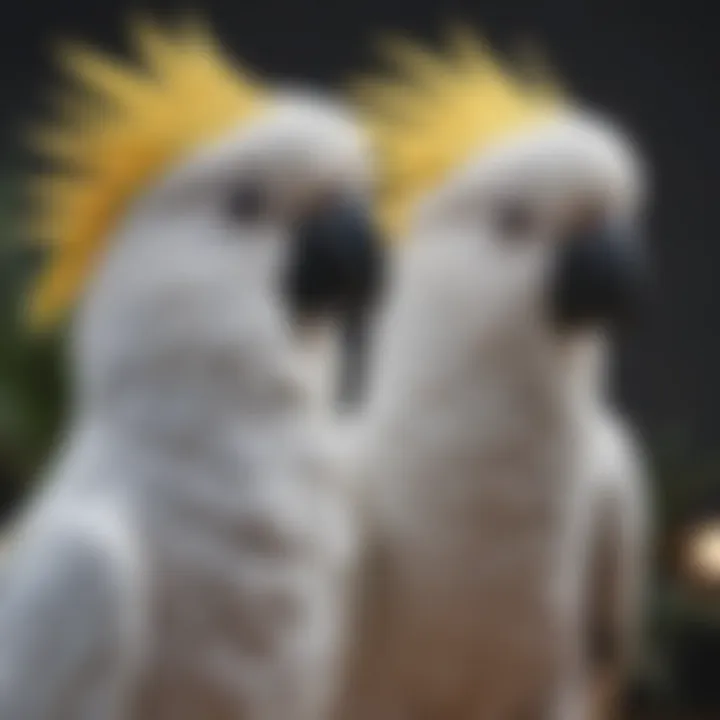
Understanding the different species of cockatoos is essential for anyone considering bringing one of these birds into their home. Each species has unique traits, temperaments, and needs. This knowledge helps potential owners make informed decisions, ensuring the chosen companion fits well with their lifestyle. Acknowledging the differences among species can also enhance the bond between the bird and owner, leading to a more harmonious living arrangement.
Common Cockatoo Species to Consider
When it comes to selecting a cockatoo, several species stand out due to their popularity and unique characteristics. Here are some common ones:
- Sulphur-crested Cockatoo: Known for its striking yellow crest, this species is highly social and demands ample interaction. They can be loud and require a lot of attention.
- Moluccan Cockatoo: This large bird has a soft pink hue and an affectionate nature. They are known for their playful demeanor but also require substantial time and social contact.
- Umbrella Cockatoo: The umbrella cockatoo's white feathers and charming personality make it a favorite among bird lovers. However, they are sensitive and need a consistent routine to feel secure.
- Goffin's Cockatoo: Smaller than the others, Goffin’s is highly intelligent and curious. This species may be a good fit for those looking for a playful companion that doesn't take up as much space.
Each species has specific behaviors and care needs. Therefore, taking time to research and understand these characteristics is crucial before making a decision.
Cockatoo Lifespans and Care Requirements
Cockatoos are long-lived birds, typically ranging from 20 to 70 years, depending on the species. This lifespan underscores the long-term commitment significant to thoughtful ownership. Understanding their care requirements is equally important. Here are some essentials:
- Diet: A balanced diet includes pellets, fresh fruits, and vegetables. Some species may also enjoy nuts in moderation. Diet can greatly affect their health and longevity.
- Social Interaction: Cockatoos thrive on socialization. Regular interaction with owners and, when appropriate, other birds is essential for their mental well-being.
- Health Care: Routine veterinary check-ups are necessary for monitoring health, ensuring vaccinations are up to date, and preventing common diseases.
Deciding to Get a Cockatoo
Deciding to get a cockatoo requires deep contemplation. These birds are not just pets; they become part of your family. Their vibrant personalities and intelligence demand serious thought. Understanding your readiness to welcome a cockatoo into your home is essential. This section highlights key elements, benefits, and considerations necessary before making this significant commitment.
Assessing Your Lifestyle and Environment
Before bringing a cockatoo home, evaluating your lifestyle and living environment is crucial. Start by asking yourself several important questions:
- Do you have enough time? Cockatoos need daily interaction and mental stimulation. They can easily become bored or frustrated if neglected.
- Is your home suitable? Space for a cage, appropriate environment conditions, and safety from hazards are things to consider. Often, cockatoos are curious and may explore amenities or objects that could jeopardize their well-being.
- Do you have other pets? The introduction of a cockatoo to existing pets should be carefully planned. Some animals may not react well to a new bird, posing stress to both the cockatoo and others.
Evaluating these factors enables a better understanding of your capability to meet the needs of a cockatoo. Ensure you have the right space and a lifestyle that permits you to interact with your bird regularly.
Understanding the Commitment Involved
Owning a cockatoo extends beyond the initial excitement of bringing one home. There are various commitments involved, involving time, resources, and emotional investment. Here are points to reflect on:
- Longevity: Cockatoos can live for over 50 years in some cases. This means your commitment is long-term, and consideration for their future is essential.
- Daily Interaction: Unlike many pets, cockatoos require daily engagement. They thrive on social interaction, and owners must dedicate time to bond and play.
- Training: Cockatoos are intelligent, which means they require proper training. This entails consistent effort to ensure they develop good habits and behaviors.
- Health Care: Regular veterinary check-ups and possible specific medical needs must be planned for. Health costs can mount, and being prepared helps manage these aspects effectively.
“Considering a pet means looking beyond just having fun. It’s all about the responsibility and lifestyle that come with your choice.”
Financial Considerations
Understanding the financial implications of adopting a cockatoo is crucial for prospective owners. While the emotional and companionship aspects are often emphasized, the costs associated with cockatoo ownership can be considerable. These financial elements include initial purchase costs and ongoing expenses that can create a significant impact on one's budget. Knowing the numbers helps prepare for the long journey of caring for these complex creatures.
Initial Purchase Costs
When you decide to bring a cockatoo into your home, the initial purchase cost can vary widely. Factors influencing this cost include the cockatoo species, the age of the bird, and the place of purchase. For example, breeds such as the Sulphur-crested Cockatoo or the Umbrella Cockatoo can range from $1,500 to $3,000, while other species might be more or less expensive.
Besides the species, the way you obtain your cockatoo also matters. Purchasing from a reputable breeder usually leads to higher costs. This price reflects responsible breeding practices and health assurances. On the other hand, buying from a pet store may seem like a lower upfront cost but often lacks transparency regarding the care or breeding history of the bird.
Here are some factors to consider in initial purchasing:
- Species: Popular species generally cost more.
- Age: Babies often carry a premium due to their demand.
- Breeder Reputation: Well-established breeders charge higher prices for better care and health.
- Location: Prices can differ significantly based on where you live.
Ongoing Expenses for Cockatoo Care
Once the initial purchase is made, ongoing costs begin to accrue. Owning a cockatoo involves several continuous financial responsibilities that can add up. Food, health care, and environmental enrichment are just a few aspects that create a regular expense.
Food is a major factor. Cockatoos require a specialized diet, including pellets, fruits, and vegetables. This diet can easily lead to monthly costs of $50 to $100, depending on your choices of high-quality ingredients.
Next, consider vet care. Regular check-ups and vaccinations are necessary to ensure health and longevity. Annual veterinary visits could cost between $100 to $300. Cockatoos are susceptible to specific health conditions; thus, monitoring their health closely is paramount.
Lastly, environmental enrichment is essential for a happy cockatoo. Toys, perches, and play structures enhance their quality of life. The expense for these items can easily be $20 to $50 monthly.
It is important to budget carefully for both the immediate and ongoing needs of your cockatoo to ensure a happy and healthy life for your new companion.
In summary, the financial commitment involved in owning a cockatoo extends well beyond the initial purchase price. Proper planning and budgeting will enhance the experience for both the owner and the cockatoo.
Finding a Reputable Breeder or Rescue
Finding a reputable breeder or rescue organization is a critical step in the process of acquiring a cockatoo. The quality of the source greatly impacts the well-being of the bird you bring into your life. Choosing the right place means ensuring that the cockatoo you select is healthy, well-socialized, and has been raised in a suitable environment. This decision can influence behavioral traits you might face later, affecting your ability to bond with your new companion.
Breeders often provide insight into the specific lineages and behavioral tendencies of their birds. They can also offer guidance on the specific needs of different cockatoo species. On the other hand, rescue organizations might emphasize the importance of second chances and re-homing, which can help reduce the number of birds in unwanted situations. Ultimately, your choice between a breeder and a rescue should align with your values and the specific needs of the cockatoo species you are interested in.
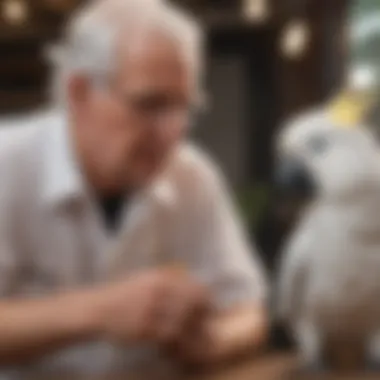
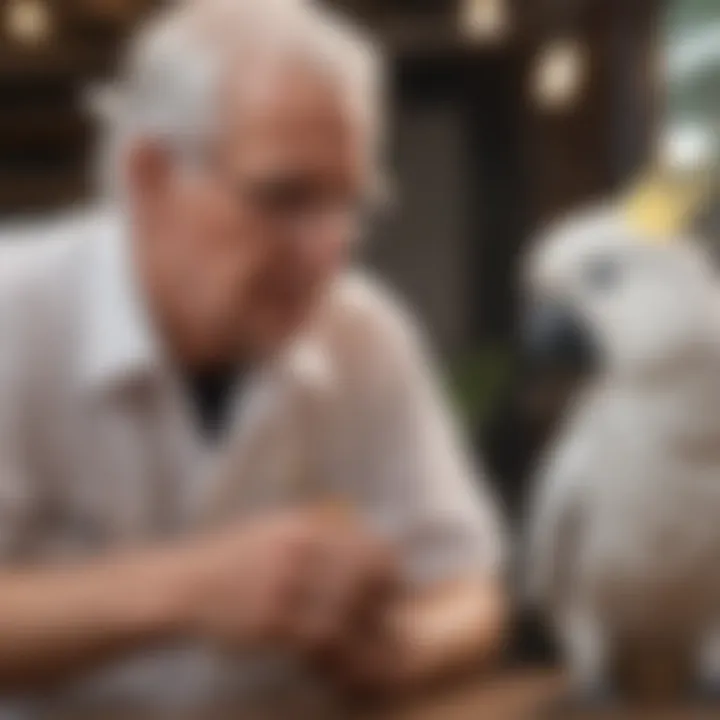
How to Evaluate Breeders
When evaluating breeders, it is essential to conduct thorough research. Here are some factors to consider:
- Reputation: Look for breeders with positive reviews and testimonials. Websites and forums can provide insights.
- Facility Conditions: Visit the breeding environment if possible. It should be clean and spacious, allowing birds to fly and socialize.
- Health Guarantees: A good breeder should provide health guarantees and have records of well-bird check-ups.
- Behavioral Socialization: The breeder should demonstrate how they handle the birds, ensuring they are well-socialized and comfortable with human interaction.
Additionally, trust your instincts. A responsible breeder will welcome questions and discuss their practices openly. Avoid breeders who are evasive or unwilling to show their facility.
Adoption from Rescues and Shelters
Adopting from rescues and shelters offers a different yet equally commendable pathway to bringing a cockatoo into your life. Many birds in shelters have previously faced hardships, making your decision to adopt potentially life-changing for them. Here are key considerations:
- Understanding the Bird's Background: When adopting, you often receive information about the cockatoo's past, including its behavioral issues or socialization needs.
- Support and Resources: Reputable shelters provide resources and potentially even follow-up support as you transition the bird into your home.
- Saving a Life: Adoption is a meaningful act that helps reduce the number of birds in captivity. It contributes to animal welfare initiatives.
Consider visiting local shelters or contacting rescue agencies with strong reputations to inquire about available cockatoos. Adoption fees are typically lower than purchasing from breeders, providing an economically friendly option, while still ensuring you are giving a bird a forever home.
Adopting a cockatoo is not just about acquiring a pet; it is about committing to the responsibility of giving them a safe and loving environment.
Preparing Your Home for a Cockatoo
Preparing your home for a cockatoo is a vital step in ensuring that your new pet has a safe, welcoming, and stimulating environment. Cockatoos are intelligent and social creatures that require more than just a cage; they need an area that caters to their physical and emotional needs. This preparation phase significantly affects their behavior and overall well-being.
Creating a Suitable Living Space
A suitable living space is essential for the comfort and happiness of your cockatoo. Start by choosing a room away from direct sunlight and drafts. This ensures that the temperature remains stable, as cockatoos can be sensitive to extreme weather conditions.
The cage should be spacious enough to allow your bird to move around freely. A good rule of thumb is to select a cage that is at least 24 inches in width, 24 inches in depth, and 36 inches in height. This size allows for wing flapping without constraint.
When placing the cage, opt for a location where your bird can interact with family members. Cockatoos thrive on social interactions, so ensuring they are a part of the household activity is crucial. Avoid isolated spots that may hinder bonding.
It may be beneficial to furnish their cage with a variety of perches, toys, and climbing structures. Rotate toys regularly to provide fresh mental stimulation and keep boredom at bay. It's also wise to avoid placing food and water bowls directly under perch, as this can lead to unsanitary conditions.
Essential Supplies and Equipment
In addition to a cage, several essential supplies are necessary for the successful care of your cockatoo.
- Perches: Choose perches made from natural wood for variety in texture. Different thicknesses can help exercise their feet.
- Toys: Invest in durable toys that challenge their intellect. Look for puzzle toys or those made from safe, non-toxic materials.
- Food and Water Bowls: Select stainless steel or ceramic bowls for easy cleaning. Ensure these are secured to minimize spills.
- Bedding: Use paper-based bedding or corn cob litter to absorb moisture and odors efficiently.
- Grooming Supplies: Regular beak and nail care is necessary. Consider a nail clipper and a cuttlebone for beak maintenance.
“Providing a proper environment is not merely a matter of convenience; it's about respecting the intricate needs of your cockatoo for their overall health.”
Beyond these basics, think about air quality. Open windows frequently for ventilation but protect your cockatoo from any toxic fumes, like those from non-stick cookware. Ensure that the existing furniture and décor are safe for curious birds. Keep items like electrical cords and houseplants that might be toxic well out of reach.
Establishing a safe and enriching environment for your cockatoo helps them adjust more effectively. This attention to detail can lead to a more harmonious coexistence and a more fulfilling life for your new companion.
Introducing a Cockatoo to Your Home
Introducing a cockatoo into your home is a pivotal moment that requires thoughtful preparation. This stage marks the transition of the bird from its former living situation to your care, where it will need to adjust to new surroundings and routines. Understanding this adjustment period is vital to ensuring the health and happiness of your new feathered friend.
A cockatoo, as a highly social and intelligent creature, will inevitably face challenges when it comes to establishing a sense of security in a new home. This section aims to elucidate the initial adjustment process and the critical role bonding plays in a successful integration.
Initial Adjustment Period
The initial adjustment period is a time of significant change for a cockatoo. It can take days or even weeks before your new pet feels comfortable. The extent of this adjustment often depends on the individual bird’s past experiences and temperament.
During this phase, maintain a calm environment. Loud noises or sudden movements can stress the cockatoo. Providing you new pet with a quiet space will help it acclimate. Consider keeping initial interactions brief and positive, allowing the cockatoo to explore its new habitat without feeling overwhelmed.
Start by letting the cockatoo settle in its cage. Ensuring it has access to food and fresh water is essential. You could hang familiar objects, such as toys or perches, that resemble what the bird had in its previous environment. The familiarity can ease the transition.
Once the cockatoo is more accustomed to its surroundings, you can begin short play sessions outside the cage. Monitor closely to see how the bird reacts. Look for signs of stress or comfort, and adjust your approach accordingly. Patience is crucial, as each cockatoo is different.
“Patience is the key for a successful introduction. Each cockatoo has its own timeline.”
Importance of Bonding and Interaction
Bonding with a cockatoo is essential for a harmonious relationship. Cockatoos are known for their social nature, and building a connection fosters trust and emotional security. Establishing this bond can significantly affect how well the bird adjusts to its new home.
Once the initial adjustment is complete, gradual interaction should begin. Use treats to encourage friendly behaviors, which will help create positive associations. Speaking softly and spending time near the bird will facilitate a connection.
Routine interaction is also critical. Cockatoos enjoy daily engagement, from playtime to training sessions. Their intelligence means they require mental stimulation, and regular contact can satisfy this need. Implementing consistent routines can strengthen the bond even further.
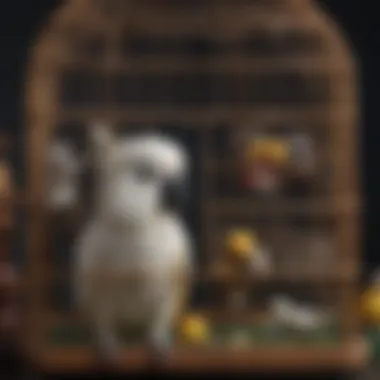
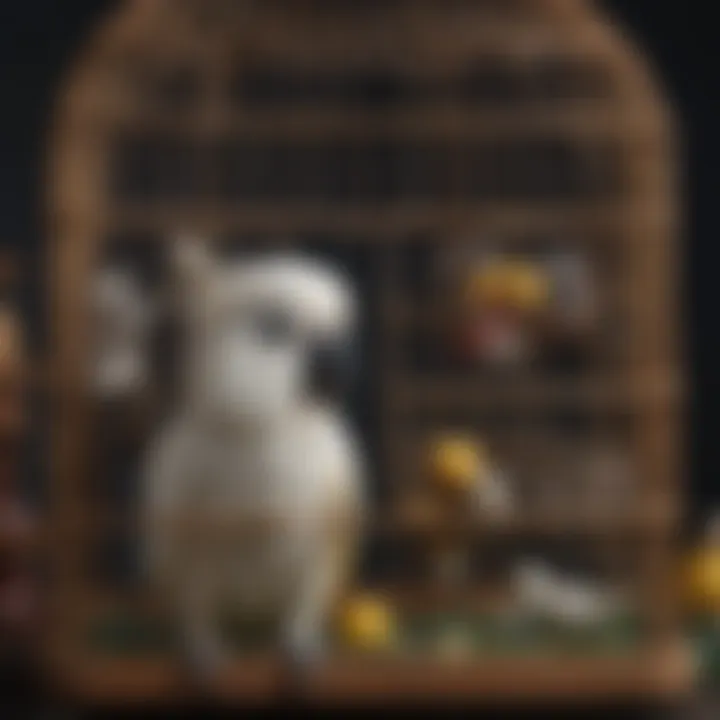
Here are a few effective ways to bond with your cockatoo:
- Regular Interaction: Spend time each day talking to and handling your bird.
- Positive Reinforcement: Reward good behavior with treats or praise.
- Shared Activities: Engage in activities that stimulate both body and mind, like foraging games.
In summary, introducing a cockatoo into your home involves careful navigation through the initial adjustment period and fostering strong bonds. The aspects outlined here serve to equip you with the knowledge needed to cultivate a healthy relationship with your new pet.
Establishing a Routine
Establishing a routine for your cockatoo is imperative for its overall wellbeing. Birds, like cockatoos, thrive on predictability. A consistent routine helps create a sense of security which is crucial for their mental health. When a cockatoo knows what to expect throughout the day, it can reduce anxiety and behavioral issues. Furthermore, a well-structured routine ensures that all essential aspects of care—feeding, socialization, and enrichment—are addressed in a timely manner.
A routine adds organization to daily life as well. For owners, knowing when to feed, when to engage with their bird, and when to provide enrichment becomes second nature. This structure can also minimize the chance of neglect or oversight, which is not only unfair to the cockatoo but can also lead to significant health problems.
Daily Care Practices
Daily care is critical for the health and happiness of your cockatoo. It typically includes feeding, cleaning, and health checks.
- Feeding: Cockatoos require a balanced diet. This should include high-quality pellets, fresh fruits, and vegetables. Regular feeding times should be established and followed.
- Cleaning: The cage should be cleaned daily to maintain hygiene. This includes changing the bedding and removing any leftovers that could rot.
- Health Checks: Observing your bird daily for signs of illness—such as changes in droppings or behavior—is important. Keeping a journal can help track any anomalies.
In addition to these basics, establishing time to interact with and train your cockatoo is vital. Birds that experience consistent, positive human interaction tend to form stronger bonds with their owners.
Enrichment and Mental Stimulation
Cockatoos are intelligent birds that require mental stimulation. Without sufficient enrichment, they can become bored, leading to destructive behaviors.
- Toys: Provide a variety of toys that encourage play and exploration. Some toys can be chewed or manipulated, appealing to their natural instincts.
- Foraging Opportunities: Create opportunities for your cockatoo to forage for food. Hiding treats within toys or in different parts of the cage can stimulate their foraging instincts.
- Social Interaction: Regular social interaction is key. Cockatoos are social animals and enjoy being part of family activities. Spend time holding or talking to your bird.
Establishing a daily routine that incorporates these elements can help your cockatoo live a fulfilling life. The structure not only provides security for the bird but also fosters a deeper relationship between you and your feathered companion.
Regularly evaluate the effectiveness of your routine. Adjustments may be necessary as your cockatoo ages or its needs change.
Health and Veterinary Care
Health and veterinary care stand as critical components for anyone considering bringing a cockatoo into their home. Cockatoos, like all pets, require regular health monitoring and access to professional care to thrive. These birds are known for their intelligence and emotional needs, which can be influenced by their physical health. Ensuring proper medical attention contributes not only to the longevity of the cockatoo but also to its overall well-being.
Veterinary care for cockatoos should not be seen as an afterthought; rather, it is a proactive measure aimed at preventing potential health issues. Understanding the specific needs of these birds will foster a responsible ownership experience.
Routine Health Check-ups
Routine health check-ups are essential for maintaining the health of your cockatoo. A veterinary professional who specializes in avian care can help assess the bird’s physical condition and address any emerging health issues. Regular check-ups generally include:
- Comprehensive physical exams to check for signs of illness or distress.
- Monitoring weight to ensure it remains within a healthy range. Weight fluctuations can indicate health problems.
- Updating vaccinations as recommended. Certain diseases can impact cockatoos.
- Discussing dietary needs and making sure the bird is consuming a balanced diet. Nutrition plays a crucial role in bird health.
Establishing a routine with your avian veterinarian increases the likelihood of early detection of health issues. This can be crucial, as some symptoms may be subtle and go unnoticed.
Common Health Issues in Cockatoos
Cockatoos are prone to various health conditions that may affect their wellbeing. Familiarity with these issues can empower owners to seek timely medical care when needed. Some of the most common health problems include:
- Obesity: Due to an overly rich diet or insufficient exercise, obesity can lead to a host of problems such as heart disease and joint issues.
- Feather Picking: This behavioral issue can stem from stress or boredom, leading to self-mutilation of feathers.
- Respiratory Problems: Cockatoos can be sensitive to environmental pollutants, which may lead to respiratory complications.
- Liver Disease: Poor diet or obesity can result in liver dysfunction, heavily impacting the bird’s quality of life.
Regular veterinary visits, alongside a keen observation of your cockatoo's behavior and eating habits, can significantly mitigate these risks. An attentive owner can spot changes in behavior that may signify a health concern and can take appropriate action.
Remember, investing time and resources into your cockatoo’s health is a commitment that reaps benefits in the form of a happy, healthy bird.
Ending and Final Thoughts
When acquiring a cockatoo, there are many essential points to consider and understand. This, at first glance, can seem overwhelming for potential owners. However, the thorough examination of each stage in this guide helps streamline the process. The objective is not just to purchase the bird but to ensure a well-informed transition into ownership.
One predominant element of this process is recognizing the commitment involved in caring for a cockatoo. These birds are intelligent and social creatures. They require both physical and emotional support to thrive. Potential owners can grasp the full scope of this responsibility through the various sections outlined in this article. These aspects include expense management, suitable living conditions, health care, and interaction needs. Ensuring these needs are met directly correlates with the happiness and well-being of the cockatoo.
Moreover, the selection of a reputable breeder or rescue is crucial. Understanding where your future pet comes from lays the foundation for a healthy relationship. Investigating the options means you are more likely to adopt a bird that is well-socialized and in good health.
In summary, investing time in educating oneself about cockatoos leads to better preparedness. This translates to a more enriching experience for both the owner and the bird. Always remember, a responsibly owned pet is a happy pet.
Summarizing Key Points
- Research Species: Different species have varied needs and temperaments.
- Evaluate Your Lifestyle: Ensure your environment can accommodate a cockatoo's needs.
- Understand Financial Commitment: Initial and ongoing costs can add up significantly.
- Choose the Right Source: Opt for reputable breeders or reputable rescue organizations.
- Prepare the Home: Create a safe and suitable space for the bird.
- Develop a Routine: Daily care and mental stimulation are essential for their well-being.
Encouragement for Responsible Ownership
Owning a cockatoo can be immensely rewarding when approached responsibly. Reflect on the decision to bring such a creature into your life. It is more than just acquiring a pet; it is about engaging in a partnership that requires dedication and love.
Potential owners should regard cockatoos as family members rather than mere possessions. Their complex nature means they need interaction, attention, and enrichment. Owners should seek out educational resources that assist in understanding their needs better. Additionally, establishing support networks through online forums or local bird clubs can be invaluable.
Ultimately, responsible ownership fosters a nurturing environment. This ensures the cockatoo not only survives but thrives. Make wise choices, prioritize the well-being of your pet, and enjoy the companionship that follows.







